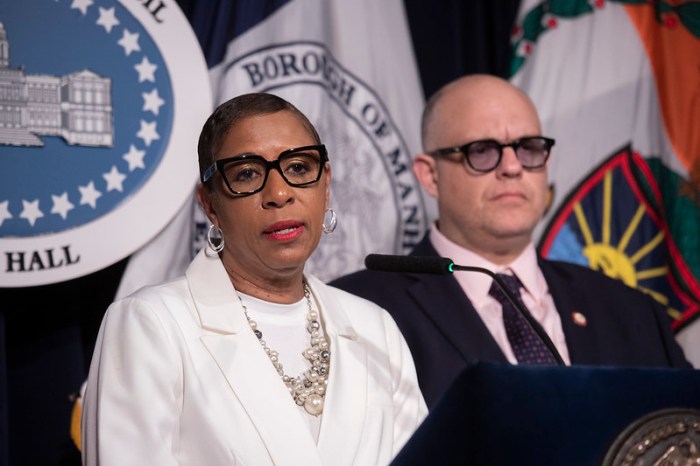
BY JACKSON CHEN | Brian Benjamin, a real estate developer and the chair of Manhattan Community Board 10, is now looking to serve his community by going to Albany, with his announcement he is seeking the vacant State Senate District 30 seat. He will be the Democratic Party’s nominee in the May 23 special election.
Benjamin, 40, has been a member of CB10 for the past six years, and became chair a year ago. Outside of the volunteer position, the Harlem resident is the managing director for Genesis Companies, a real estate firm with projects in New York and New Jersey.
Benjamin said in his years on the community board he has confronted the district’s encroaching gentrification and the consequent squeeze on affordable housing, which has given him the experience to be an effective advocate in the Senate.
District 30, which encompasses portions of the Upper West Side and Central and East Harlem, was vacated when incumbent Bill Perkins secured a special election victory for the City Council District 9 vacancy on February 14. After being in Albany for roughly a decade, Perkins felt that returning to the Council, where he served from 1998 until 2005, would afford him more opportunities to deliver benefits for his neighborhood.
The seat Benjamin is vying for roughly matches CB10’s coverage area, though the East Harlem portion of District 30 is outside of his community board’s jurisdiction. The Democratic contender said he expects to focus on four major issues: affordable housing, funding for education, reforming criminal justice, and promoting job diversity.
“In Central Harlem, I am very familiar with those concerns, I’ve been dealing with them for the last six years,” Benjamin said. “I have a track record of solutions and joint ventures that give me an instant credibility… people know I have value and care about issues in our district.”
Beyond his community board work, another major volunteer initiative of Benjamin’s was his work in founding Harlem for Obama, a grassroots group launched in 2007 to build support for the Illinois senator in his match-up against New York Senator Hillary Clinton. Though the former president would go on to win a significant edge among Harlem voters in the 2008 Democratic primary, a year earlier he remained a relatively little known figure in New York, even among African Americans. The experience Benjamin gained there, he explained, taught him a lot about organizing through small fundraisers and registering people to vote. With that grassroots know-how, his current campaign is now focused on door-to-door canvassing, phone banking, and reaching out to block and tenant associations.
Benjamin acknowledged he would be entering a State Senate where Republicans stubbornly hold on to the leadership, with the eight-member Independent Democratic Conference and one conservative Democrat from Brooklyn lending their votes to the 31 GOP senators in the 63-seat chamber. Despite the allure the IDC offers of Democrats sharing in the Republican leadership spoils, Benjamin insists that, if elected, he would remain loyal to his mainline party colleagues.
“It’s not a great situation, that’s a fact,” he said of the Senate’s current leadership structure. “But I think it’s important to focus less on being hostile with each other as Democrats and focus more on how do we bring our coalition back together.”
Benjamin added, “What’s clear is that we need to come back together sooner than later, and I want to be a part of the efforts to bring us back together.”
Benjamin will face off against Republican Dawn Simmons, a charter school advocate who was an alternate Trump delegate at last summer’s GOP National Convention. Simmons also ran against Perkins in the February City Council contest.
According to a Manhattan Republican Party release, Simmons was endorsed on March 11 and said she was “proud to garner the Republican line for this important role.”
“One of the reasons why Democrat Bill Perkins left was because he felt he didn’t have a voice,” Simmons said in the statement, alluding to the Democrats’ minority position in the Senate. “I will be that voice that our residents need.”
Simmons did not respond to Manhattan Express’ request for an interview.
The May special election will decide who holds Perkins’ former seat through the end of 2018.

















